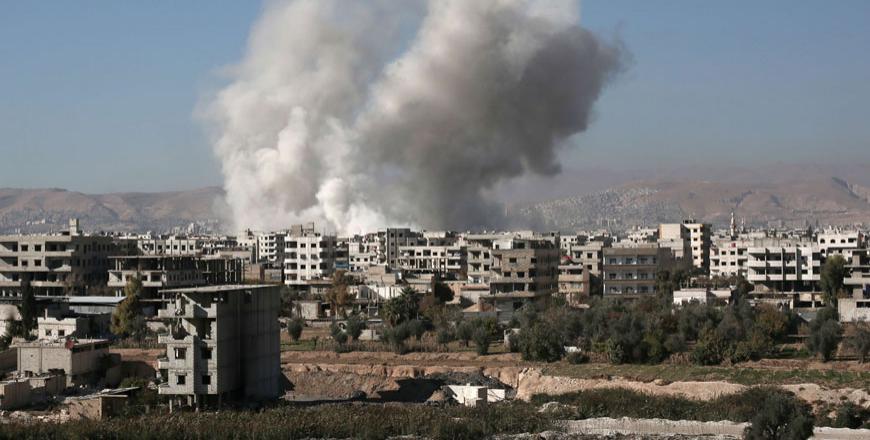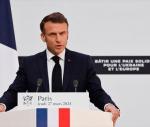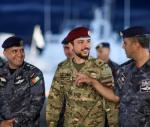You are here
Syrian opposition sets new conditions for peace talks
By AP - Jan 27,2016 - Last updated at Jan 27,2016

A fighter for Syrian pro-government forces walks past damaged buildings on a street in the town of Sheikh Miskeen in southern Daraa province on Tuesday after the Syrian army and its allies retook the strategic town from rebel forces (AFP photo)
BEIRUT — One of the main Syrian opposition blocs said Wednesday that it was unlikely to attend Geneva peace talks this week unless progress is made toward lifting sieges in the country and other conditions are met, adding that it was awaiting clarifications from the UN envoy.
The announcement cast further uncertainty on peace talks scheduled to begin in two days.
Expectations are already low for any breakthroughs during talks that UN envoy Staffan de Mistura has described as the start of a drawn-out process of consultation between various parties to the conflict, rather than actual peace negotiations.
Khaled Nasser, a member of the Syrian National Coalition — one of the main opposition groups in the bloc — said Wednesday that he believed negotiations with limited ambitions would "waste time".
"Friday was never going to be the start of negotiations," said Nasser. "De Mistura said it is for consultations and discussions.... We don't want to waste time with consultations and discussions."
Still, the group was meeting in Riyadh for a second day on Wednesday to make a final decision.
The talks are intended to start a political process to end the conflict that began in 2011 as a largely peaceful uprising against Syrian President Bashar Assad but escalated into an all-out war after a harsh state crackdown. The plan calls for cease-fires in parallel to the talks, a new constitution and elections in a year and a half.
In a sign of the complexity of the task, de Mistura said the delegations in Geneva would initially be sitting in separate rooms and he would shuttle between them.
Tensions have also flared over who would be invited to the talks, and the opposition has demanded confidence-building measures from the government on humanitarian issues.
In a statement released at the end of daylong meetings in Saudi Arabia late Tuesday, the opposition coalition known as the Higher Negotiating Committee referred to the “necessity of realising genuine improvements on the ground before starting in the negotiating process”.
The Saudi-backed committee is headed by Riyad Hijab, a former prime minister who defected to the opposition in 2012. It represents a bloc that includes the Syrian National Coalition and many of the major rebel factions fighting in Syria.
The bloc outlined its conditions for participating in the talks in a letter to UN chief Ban Ki-moon. While the group left open the possibility of its eventual participation, it said it awaits a reply from him on its conditions.
The opposition has also accused Russia, a key backer of the Syrian government, of trying to “dictate” who from the opposition would participate.
Moscow has insisted on the participation of the main Syrian Kurdish group — the Democratic Union Party, or PYD — which plays an important role in fighting the Daesh terror group and is an essential part of any political settlement in Syria.
Turkey, a major backer of the rebels, sees the PYD and its YPG militia as branches of the Kurdistan Workers’ Party, known as the PKK, which has waged a long insurgency against Ankara. Turkey has threatened to withdraw its support for the talks if the PYD is represented.
French Foreign Minister Laurent Fabius told France-Culture radio on Wednesday that the PYD was not invited.
“The PYD group, the Kurdish group, was causing the most problems, and Mr de Mistura told me he had not sent them an invitation letter,” Fabius said.
Saleh Muslim, the co-president of the PYD, was in the Swiss city of Lausanne Wednesday. Kurdish officials said he was invited by the Swiss government to serve as an adviser to the talks.
Another veteran opposition figure, Haitham Manna, who was also in Lausanne, suggested he would boycott the talks unless the PYD was invited.
“The Syrian [opposition] delegation must be represented very strongly to enable it to defend the Syrian people’s interest,” he told The Associated Press Wednesday. “If they accept to give us this possibility for a delegation that is Syrian — not Russian, not Saudi, not Turkish, not Qatari — then we are ready to do our best,” said Manna, who heads the Syrian Democratic Council, an opposition group that includes the PYD.
Fabius said the Riyadh-backed Higher Negotiating Committee should be the primary negotiator for the rebels.
The Riyadh bloc is a broad coalition that includes several armed Islamist groups, such as the powerful Jaish Al Islam, which the Russian and Syrian governments consider a terrorist group. It does not, however, include Daesh or Al Nusra Front, two militant factions that control large areas of Syria and are not participating in peace talks.
Related Articles
DUBAI — Syrian opposition groups gather in Saudi Arabia Tuesday to unify their stance ahead of potential talks with the regime of President
PARIS — The Syrian Kurdish YPG militia and its political arm the PYD will not be invited to planned peace talks in Kazakhstan, a PYD officia
MOSCOW — Russia on Tuesday argued strongly against Turkey's demand to keep a leading Kurdish group out of Syrian peace talks, and said it ex

















